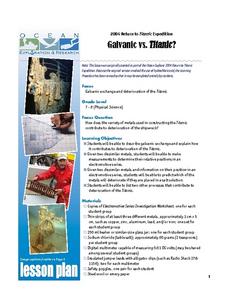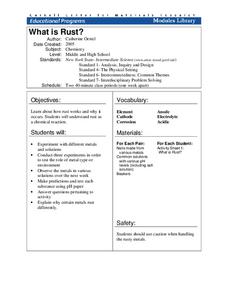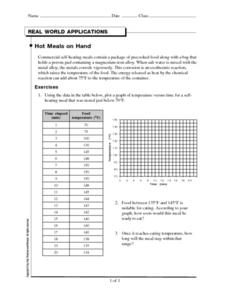Curated OER
Redox Titration of Iron
Students perform a redox titration of iron. In this iron titration lesson plan, students use potassium permanganate to oxidize iron so they can determine the percentage of iron in a sample of fertilizer.
Curated OER
Corrosion & Rust
Students examine how and when rust and corrosion occur. In this corrosion instructional activity students complete an experiment to see why metals rust.
Curated OER
Corrosion/Conservation/Preservation
Students examine the reasons why metal corrodes in regard to metal artifacts. In groups, they discover the affects of salt water on metal and compare the type of corrosion found on iron. They also research the types of metal...
Curated OER
Oxidation And Corrosion
Students investigate the concepts of oxidation and corrosion. They identify different metals and forms of corrosion.
Curated OER
Bridge Cable Corrosion
Students investigate the corrosion of different materials in the lab. In this chemistry lesson, students construct a bridge considering different bridge designs. At the end of the lesson, they play the role of scientists and engineers...
Creative Chemistry
Use of Common Metals
In this metals learning exercise, learners read about the different properties of aluminum, copper, and iron and determine why these metals are used the way they are. The exercise has five short answer questions.
Curated OER
Some Common Chemical Reactions
For this chemical reactions worksheet, students compare and contrast corrosion and combustion reactions. This worksheet has 15 short answer questions.
Curated OER
The Iron Cheesebox
Students describe the oxidation/reduction reactions that are involved in the corrosion of iron in seawater. In this marine sanctuary lesson students study the steps in conserving marine archaeological artifacts.
Curated OER
Electroplating for Corrosion Protection: Redox in Action
Students define what a redox reaction is. In this chemistry activity, students electroplate some wires in the lab. They research the application of electroplating in the real world.
Curated OER
Rusting-A Form of Oxidation
Learners conduct an experiment to observe oxidation. In this chemistry instructional activity, students explain how rusting happens. They rank metals according to their conductivity.
Curated OER
Galvanic vs. Titanic?
Students discover how galvanic exchange has contributed tot he deterioration of the Titanic. They perform an experiment in which they predict which of 2 metals deteriorate when placed in a salt solution.
PBS
The Elements
An attractive handout displays the periodic table of elements in full color. Each group has its own color, and each element is represented by its name, chemical symbol, atomic number, and atomic weight. What makes this periodic table...
Curated OER
Rusting-A Form of Oxidation
Students observe the rusting process in the lab. In this chemistry lesson, students rank metals according to their conductivity. They give real world applications of this activity.
Curated OER
Corrosion/Plating/Electrolysis
Students familiarize themselves with half cell reactions, potential circuits, etc. They participate in a lab that includes a worksheet that guides them through an inquiry pertaining to the content. They complete a series of questions...
Cornell University
What Is Rust?
Why do metals rust differently? Scholars experiment with metal combinations in a hands-on activity. They create unique environments with different metals and compare the rate and amount of rust for each.
Curated OER
Rusting: A Form of Oxidation
Learners observe and record the corrosive nature of oxidation-reduction reactions, and determine the electro-chemical series of selected metals.
Curated OER
Magnets Challenge
In this magnets activity, students read 11 definitions that pertain to magnets. From four choices, students choose the word that matches each meaning.
Curated OER
Reactivity Series of Metals
In this reactivity series worksheet, 10th graders complete 10 short answer questions on metals. They identify and balance chemical reactions.
Curated OER
What Influences Reaction Rate?
Middle schoolers study reaction rates, what determines how fast a reaction happens and how the chemical changes occur. In this reactions lesson students complete a lab where they use Alka-Seltzer to observe reaction rate and create...
Curated OER
Periodic Table of the Elements
Students experiment with transition metals. In this transition metals lesson students find the common properties of transition metals and conduct an experiment using one of them. Students then answer questions regarding what...
Curated OER
Look At A Landfill
Students explore how landfills function. For this landfill lesson, students explore the use of landfills and the decomposition process by creating a model landfill. Students discuss pros and cons to landfills and how potential problems...
Curated OER
Hot Meals on Hand
In this exothermic reactions worksheet, students read about how commercial hot meals are heated through the use of exothermic reactions. They graph data of temperature and time elapsed for hot meals and answer two questions about the graph.
BBC
Bbc: Gcse Bitesize: Transition Metals, Alloys and Corrosion
The transition metals are placed in the center of the periodic table, between groups 2 and 3. They are generally hard and dense, and less reactive than the alkali metals. Iron, copper, silver and gold are important transition metals. A...






















